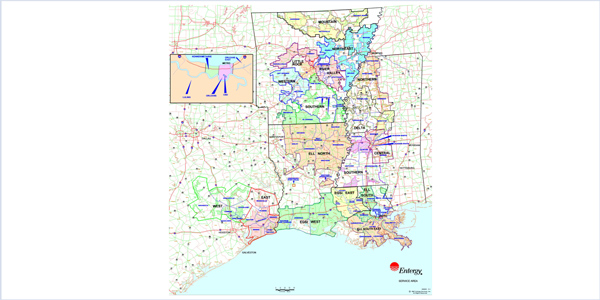By Tom Kleckner
The D.C. Circuit Court of Appeals on Friday denied the Arkansas Public Service Commission’s request that it review a 2016 FERC order directing Entergy Arkansas to continue sharing settlement proceeds under the Entergy System Agreement (16-1305).
FERC approved Entergy Arkansas’ withdrawal from the agreement in 2009. In 2016, FERC held that the utility must continue to share the proceeds of its predeparture settlement with Union Pacific with the system’s other member companies (ER13-432).
The PSC contended that the commission’s order to share the settlement benefits and its method of allocating the benefits was unlawful and unsupported by substantial evidence.
The D.C. Circuit concluded that FERC had a lawful basis to order the sharing of the benefits and was “reasoned” in its allocation methodology.
The PSC pointed to Entergy Arkansas’ withdrawal proceeding in arguing that FERC’s order “essentially amounts to the imposition of an unlawful exit fee or post-withdrawal continuing obligation.”
Writing for the three-judge panel, Senior Circuit Judge David Sentelle rejected the argument, saying FERC was right to conclude “that sharing the Union Pacific settlement benefits was necessary under the principles of equity and was not a penalty or recompense for the company’s exit from the system.”
The court also disagreed with the PSC’s contention that FERC violated the filed rate doctrine by ordering Entergy Arkansas to share the settlement benefits. Under that doctrine, public utilities may only charge rates filed with FERC.
Sentelle said FERC had determined it was not overriding a filed rate, “but merely effectuating the purpose of a non-jurisdictional contract.” He noted Entergy Services was a party to the settlement, and that “FERC found [Services] entered into the settlement on behalf of all the operating companies while they were under FERC’s jurisdiction through the system agreement.”
The court also agreed with FERC’s use of its allocation method, noting the commission found it likely “Entergy Arkansas would have entered into a multiyear transportation contract in 2011 and not benefited from [a] price dip in 2012” without the Union Pacific settlement.
“There was no evidence that Entergy Arkansas could have anticipated the 2012 drop in coal transportation prices and made different contracting decisions,” Sentelle said.
The proceeding stemmed from a 2008 settlement in Arkansas state court between Entergy Arkansas, Entergy Services and other parties against Union Pacific. The settlement locked in a below-market rate for rail delivery of coal by extending an Entergy Arkansas contract with Union Pacific to a three-year period ending June 30, 2015.
Under Entergy’s system agreement, which expired in 2016, its operating companies purchased excess energy from their sister companies at cost, incorporating coal transportation as a component. Union Pacific failed to make coal deliveries at one point, leading to the settlement.
Entergy Arkansas passed a portion of the increased coal costs to the other operating companies under the agreement’s service schedule, and also shared its beneficial coal transportation costs under the Union Pacific settlement.
However, the settlement did not address Entergy Arkansas’ impending withdrawal from the agreement, which FERC approved in 2009.
The Louisiana Public Service Commission filed a Section 206 complaint with the commission, arguing that FERC should allocate the Union Pacific settlement benefits as part of the case. The D.C. Circuit eventually upheld the commission’s decision, but it held FERC “must still review the post-withdrawal arrangements.”
The Louisiana commission again raised the Union Pacific issue when Entergy Services filed a post-withdrawal successor plan with FERC. In response, the Arkansas commission and Entergy Services challenged FERC’s authority to order Entergy Arkansas to share the settlement benefits, because the utility was no longer participating in the system agreement.
Following settlement discussions and a hearing, an administrative law judge determined that the settlement benefits should be allocated among the operating companies and adopted an allocation methodology. FERC affirmed the findings in 2016 and ordered Entergy Arkansas to make a compliance filing refunding the settlement benefits to its sister companies.





